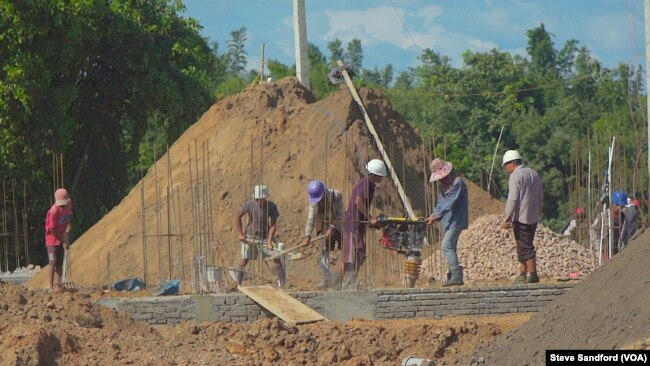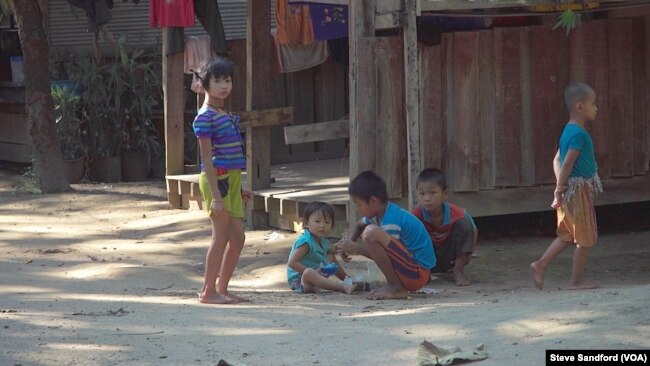In the dusty Myanmar border town of Shwe Koko, ethnic Karen shop owner Saw Tu wipes the dust off a bag of red chili peppers as he prepares for another day of business at the local market, VOA news reports.
Basic amenities like rice, onions and cooking oil are available at Saw Tu’s open front shop, but the town’s infrastructure has seen little improvement since a 2012 cease-fire was signed between the Burmese army and several ethnic armed groups within the state.
Saw Tu, who fled his homeland more than two decades ago but returned in 2011, says, “Many people need the water supply and some areas don’t have electricity and a water system. We only have it in the market business area.”
While the local infrastructure is still lacking, economic growth is rising in the way of a major construction project at the edge of town.
A resort area, dubbed by the locals as “Chinatown,” is being developed next to the Moei River, which separates Myanmar from Thailand.
The mega resort and city expansion will encompass 809 hectares along the border area – including luxury housing, condominiums, hotels, shopping centers, a golf course and several casinos.
Currently, it is illegal to operate casinos in Myanmar.
The investment is backed by a Chinese state-owned company, Jilin Yatai Group, that lists building materials, real estate, pharmaceutical, finance, coal, and trade and business industries in China on the company website.
The multi-conglomerate company signed a partnership with officials from the local Border Guard Forces, or BGF, who were previously part of the Democratic Karen Buddhist Army, (DKBA) a former ethnic army that became the first of several ethnic armed groups to sign a cease-fire with the Burmese military.
The militia group oversees some lucrative businesses – including a handful of casinos – in a region within the government-controlled area of Karen state in eastern Myanmar.
There have been objections to the so-called city expansion project from local residents who are concerned that the casinos will have a negative effect on the local youth and job opportunities will be limited to manual laborers for the construction of the massive project.
Land values have soared in recent years with the construction of the second Thai-Myanmar Friendship Bridge, which runs across the Moei River, close to Shwe Koko.
It is scheduled to open this year, along with a huge customs office area.
The rise in prices comes with increased land confiscation.
The Karen Human Rights Group (KHRG) a grassroots ethnic Karen-led human rights organization, has documented multiple cases of land confiscation which they included in a March 2018 report.
According to the report, the BGF held meetings, starting in 2018, promising villagers that the project will benefit the local people,
One of the land confiscation victims, who did not want to be identified for safety reasons, said the landowners had complained in person to the BGF commander but had not been able to file official statements.
“The people, who live here, especially farmers, cannot read or write, so they just reported verbally,” the villager recounted to rights workers.
The villager also said that people who had their houses destroyed were compensated but the people who had only their land confiscated have not yet been paid anything.
Thailand’s Mae Sot Commerce Advisor Suchart Treeratvatan says, “The big challenge for the development is the price of the land has risen very high in the last three to four years. The price has increased more than 100 percent and that has interrupted development in the area.”
While land prices have risen significantly on the Thai side of the border, local land owners in Karen state were reportedly getting just a third of the asking price of $4,700 per hectare.
The price gouging is no surprise to international observers.
“Agricultural fields have already been confiscated and houses destroyed to make way for a concrete processing plant and condominiums, which are supposedly the first phase of construction,” explains Duncan McArthur, of The Border Consortium (TBC).
TBC is the main provider of food, shelter and other forms of support to approximately 92,000 refugees from Myanmar who live in nine camps in western Thailand. These are refugees who escaped civil war in Myanmar.
“Indeed, the lack of transparency and regulation makes a mockery of the government’s Sustainable Development Plan and commitment toward forging a prosperous, peaceful and democratic nation,” McArthur adds, pointing out that nearby casinos have already led to social conflict and an illicit drug trade.
Saw Min Min Oo, a BGF official and member of the Shwe Koko Development Committee, remains upbeat.
“In the future we want to connect this ASEAN road to One Belt One Road and then our area will be more developed to do good business.” One Belt One Road is a major Chinese global infrastructure project.
Meanwhile, nearly 100,000 Karen refugees who have faced more than six decades of civil war remain in limbo, awaiting better conditions for a safe return to their homeland – a region that is slowly being overcome by foreign development. The Karen ethnic minority has been fighting for independence in Myanmar since 1949.


